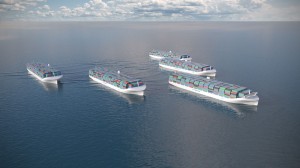According to Rolls Royce, the answer is, “Yes.”
The team at Rolls Royce has recently made progress on a virtual-reality prototype for unmanned cargo ships that would allow logistics companies to load freight on ocean liners without a single crew member aboard. The idea is that captains on dry land could use high-tech control centers to command hundreds of ships, all without getting out of their chairs. There seems to be a lot of talk of delivery drones lately with the Amazon shipments and now we’re talking about entire cargo ships. But is it a good idea?
The Cons
Skeptics don’t think the cost-savings is justified. Tor Svensen, CEO of maritime for DNV GL, the largest company that certifies vessels for safety standards, said that the potential savings don’t justify the investments that would be needed to make the ships safe. Others point to more regulatory issues.
Unmanned ships are currently illegal and aren’t eligible for insurance. Transporters could also run into difficulties regulating vessels in their own waters and enforcing international rules.
Lastly, there is of course a great deal of union opposition. The chairman for the International Transport Workers’ Federation said that “[Drones] cannot and will never replace the eyes, ears, and thought processes of professional seafarers.”
The Pros
Drone ships, although they would require a substantial initial investment, would cut down on costs for the $375 billion shipping industry, namely by cutting down on the $3,299 a day (or 44% of total operating costs) that it takes to maintain a ship’s crew. It would also create cost-savings because transporters could fit more on a single ship. By getting rid of the bridge and the other systems that support people onboard (think electricity, water, sewage, and air conditioning) containers could be packed across the entire ship from front to back – plus, the ships would burn 12-15% less fuel!
The ships may also prove to be safer, as they would have redundant systems for remote control, preventative maintenance, emergency backups, and the computers would constantly analyze operations to improve efficiency.
There would be less of a threat of piracy without any crew on board to take hostage. Not to mention the fact that human error actually causes most maritime accidents.
What does LILLY think?
Honestly, we are in favor of the idea! Drones would help us cut down on costs, which in turn means that our customers (that’s you!) would save money. We agree that the ships would be safer and less polluting, too. We are also in favor of better working conditions for maritime professionals – removing them from the ships would mean more jobs on land, both steering the ships and repairing and unloading them at ports, thus giving them a better quality of life.
What do you think? Let us know in the comments!


